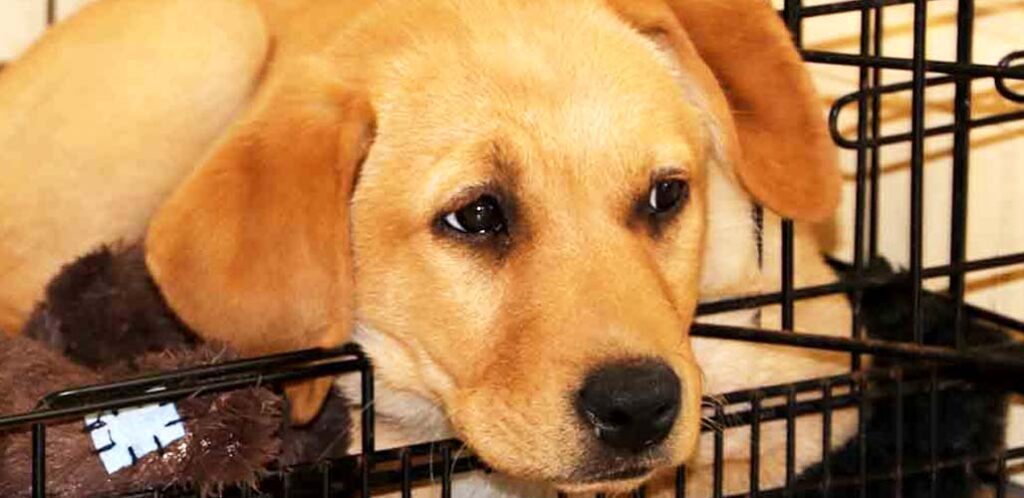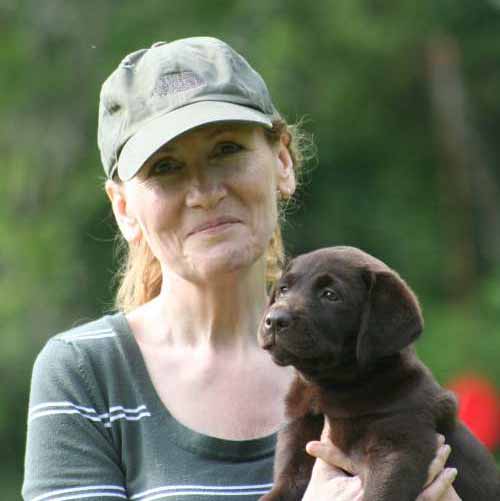
How long does it take to train a puppy? In this article we take a look at how long it takes to teach a puppy the essential lessons they need to learn in order to live with you, and basic obedience so you feel confident taking them out in public.
Most puppies can complete basic obedience training by the time they’re a year old. But the exact time frame varies according to a range of factors. And puppy parent never really stops training their dog, even when they’re quite old and reliable!
How Long Does It Take To Train A Puppy?
This is one of the most common questions our readers ask. And it’s no wonder – untrained puppies are disruptive, exhausting, and hard work! It’s only natural to want to know when your young dog will behave like the easy going and well behaved older dogs you’ve seen strolling with their owners at the park. If you’re reading this before you even commit to getting a puppy, you might be wondering if you’ll have enough time to train them properly, besides fulfilling all your other obligations to work and family.

The truth is, how long it takes to train a puppy depends on several factors. Including:
Breed
Some breeds are much more responsive to training than others. For example, dog breeds with a long history of working alongside human handlers are more easily motivated to take part in training. And they and tend to pick up new cues more quickly. Retrievers and spaniels are good example of this kind of dog.
On the other hand, breeds with no working history, such as Pugs and Chihuahuas, tend to be slower to learn new cues. And breeds which were expected to work without close input from a human handler (such as terriers and guardian breeds) can sometimes seem headstrong and disinterested in training. These dogs are still trainable, but training them might take longer.
Individual personality
Even within a breed, individual dogs all have their own personality. Some dogs are spookily good at anticipating our whims, and easily rewarded (for example food lovers!) Other dogs are less good at problem solving, have a short attention span, or are unimpressed by edible snacks. They can be trained using force free techniques and positive reinforcement, but you can only teach them as quickly as they can learn. And some dogs take longer to work through the stages of obedience training than others.
How much time you dedicate to it
Like so many things in life, the more you put into training your puppy, the more you will get out of it! But that doesn’t mean you have to spend hours training your puppy every day. Not many puppies would have the concentration span for such a schedule anyway. But what really matters is training frequently and consistently. So if you commit to spending 10 minutes twice a day training your puppy, and stick to it religiously, you will see results quicker than if you only do training at weekends, or once a week at puppy class.
What training technique you use
Old fashioned training techniques involved a lot of physically manhandling puppies into position, and punishing them for moving out of position without permission. It also used to be widely frowned upon to use edible treats in training. Today, we know a lot more about how dogs learn, and how to teach them so that they learn quicker, and more effectively. For example, we know than dogs learn faster if they are trained using force free techniques and rewards for getting it right. We also know that using punishment impairs learning, so training takes longer. And that dogs don’t find social esteem very rewarding – so praise isn’t enough to reinforce training.
What you define as ‘finished’
Some skills we teach our puppies have an obvious point at which they are accomplished. Such as potty training, or reliably greeting people politely without jumping up. Other skills are built up in layers, such as walking on a loose leash for increasing distances, or responding to a recall cue around mounting distractions. So how long it will take you to achieve your desired standard in these areas depends upon what your expectations are at the beginning!
In reality, lots of types of training are never completely finished. And that’s because dogs never stop receiving feedback for their choices. If you stop rewarding the ‘finished’ response to a cue, then obeying you will start to lose its value, and your cue will stop working so reliably.
For some working dog breeds, training should never finish because they have an enormous appetite for mental stimulation. These dogs need continuous, evolving, and varying training games throughout their prime. Otherwise they can become bored, frustrated, and destructive.
How Long Does Training A Puppy Take?
So with all those factors in mind, let’s take a look at how long it takes on average to achieve some different types of training.
How long does it take to potty train a puppy?
Successful housetraining depends upon building up a long, unbroken pattern of always toileting outdoors. Very young puppies can’t recognise that their bladder is full until the very last minute. And they don’t have much control to hold it in past that point either. Until they are more mature, it’s up to you to be proactive about making sure they’re in they’re right place every time they pee. For most breeds, you can expect to take an active role in potty training until your puppy is 6 or 7 months old. For some toy breeds with very small bladders, you can expect toilet training to take up to a year.
How long does it take to crate train a puppy?
Having a puppy makes your world quite small for a while. Lots of puppy parents are desperate to know when they will be able to crate their puppy for long enough to pop to the store, or go out for lunch.
Crate training needs to be built up in layers of duration, starting with just seconds and building up. The biggest trap people fall into is trying to leave their puppy for too long, too soon. This results in their puppy has a very distressing experience in the crate. If you avoid this, then it’s likely you can have your puppy largely crate trained by the time they are 3 months old.
Some puppies take longer to crate train, and it’s important to work at a pace they are comfortable with, rather than the pace you wish they would achieve.
How long does puppy obedience training take?
There are lots of aspects to obedience training. Some examples are:
- Recall
- Loose leash walking
- Sitting and waiting patiently in one spot when asked
- Settling in bed when told
- Not jumping up
- Ignoring food or objects dropped on the floor, unless given permission to take them
These behaviors all need to be taught in layers of difficulty, and practised around all kinds of distractions, to achieve a reliable result. One big advantage of training a puppy from scratch is that you can control the process very carefully. So that your puppy doesn’t have a chance to learn competing unwanted behaviors, or accidentally get rewarded for ignoring you.
On the other hand, you’ll also have to tackle disruptions along your training journey, such as hormonal changes during puberty. Lots of puppy parents have had very biddable puppies at 4 months old, and then wondered where it all went wrong 2 months later! Adolescent dogs often need treating a bit like puppies again, to make sure the right choices remain the most rewarding choices, and they don’t reinforce their own bad behavior. For that reason, a puppy is never fully trained until they grown up, no matter how well it seems to be going at 4 months old!
How Long Does Puppy Training Take? Summary
Dogs who are strongly motivated to cooperate with people, and who receive frequent, consistent training, often reach a good standard of training by around 12 to 18 months old.
Some puppies will take longer, for example if they are a breed which isn’t associated with being easy to train, or one which is slow to reach emotional maturity. Puppy training also takes longer if you don’t commit to doing a little bit every day, or if you don’t make the ‘right’ behaviors rewarding enough.
References
Alexander et al. Obedience training effects on search dog performance. Applied Animal Behaviour Science. 2011.
China et al. Efficacy of Dog Training With and Without Remote Electronic Collars vs. a Focus on Positive Reinforcement. Frontiers In Veterinary Science. 2020.
Rooney & Cowan. Training methods and owner–dog interactions: Links with dog behaviour and learning ability. Applied Animal Behaviour Science. 2011.
Serpell & Hsu. Effects of breed, sex, and neuter status on trainability in dogs. Anthrozoos. 2005.
Turcsan et al. Trainability and boldness traits differ between dog breed clusters based on conventional breed categories and genetic relatedness. Applied Animal Behaviour Science. 2011.

Free Training Tips
Get Pippa's free dog training tips delivered to your inbox

 Puppy Pad Training Spray
Puppy Pad Training Spray